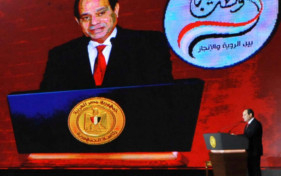
Cairo: Egyptian President Abdul Fattah Al Sissi’s Friday announcement of his intention to run for a second term in office in the March election came as no surprise. Al Sissi is widely expected to win the election.
Al Sissi, a former defence minister, has largely restored security in Egypt after years of unrest that followed the 2011 uprising against former president Hosni Mubarak.
His backers see him as a key guarantee for the country’s stability amid a wave of militant attacks.
Observers say his popularity has suffered due to painful economic reforms, which Al Sissi has repeatedly defended as necessary to revitalise the economy battered by the post-Mubarak turmoil.
“I did not hesitate to take the reform decision against advice that I should delay the decision in order to preserve my popularity,” he said this week. “But I considered any such delay tantamount to treason.”
Since taking office in 2014, Al Sissi has shown interest in launching major development projects across the most Arab populous country of nearly 95 million people.
“I have done my best during the period I have spent as the president of the republic,” Al Sissi, 63, said in televised remarks late Friday.
“If Egyptians would like to show gratitude, they have to go and cast their ballots and show the world how Egyptians make their free choice [of their president].”
Al Sissi also pledged fair and free elections.
Very few presidential hopefuls have so far come forward and declared bids to contest in the polls scheduled for March 26-28.
Former chief of the army staff, Samy Annan, early Saturday announced his intention to stand for president.
The former general, 69, urged civil and military institutions to observe neutrality in the elections.
Prominent rights lawyer Khaled Ali, a vociferous critic of Al Sissi, has also said he will run.
According to the Egyptian constitution, an eligible presidential contender must secure endorsements of 20 members of parliament or 25,000 voters from at least 15 from the country’s 27 governorates.
The majority of parliament has endorsed Al Sissi for running for the second term.
It is still unclear yet if any challenger will be able to collect the signatures necessary for candidacy.
Annan’s loyalists said they are in the process of collecting the necessary signatures from voters. Annan withdrew from the 2014 election that Al Sissi won with a landslide.
Ali, 49, this week accused pro-Al Sissi bureaucrats of obstructing his supporters from registering endorsements for him. Candidacy registration started on Saturday and runs until January 29.
Ali’s presidential bid is also at stake as he was sentenced in last September to three months in prison on charges of public indecency. He has appealed the sentence, claiming the case is politically motivated. If he is finally convicted, he could be disqualified from the presidential race.
Former MP, Mohammad Al Sadat, a nephew of late president Anwar Al Sadat, last week announced pulling out of the presidential race, blaming what he called “unfavourable political atmosphere”.
The young Sadat, who was expelled from the parliament last year, said his retreat was aimed at sparing his campaigners alleged harassment by authorities.
Earlier this month, former prime minister Ahmad Shafiq renounced an earlier plan to stand for president.
Both Shafiq and Ali unsuccessfully contested Egypt’s 2012 presidential elections won by Mohammad Mursi of the Muslim Brotherhood.
In 2013, the army, then led by Al Sissi, toppled Mursi following enormous street protests against his rule.
BOX
Timetable of Egypt’s presidential polls
Jan 20-29: Candidacy registration
February 1-2: Filing of objections against registered candidates.
February 24: Final list of eligible candidates to be announced by the Election Commission.
February 24-March 13: Campaigning by contenders.
March 16-18: Egyptians living and working abroad will cast their ballots.
March 26-28: Egyptian at home will cast their ballots.
April 2: Results of the first round will be announced.
April 24-26: If needed, a run-off will be held.
May 1: Final result will be announced.












